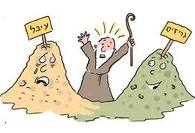Blessing & Curses

"See I give before you today blessing and a curse the blessing that you will hear all the commandments ... The curse if you will not hear..." (11, 26-28)
This verse has a marked change between the blessing and the curse: blessing was said "that you will hear", while the curse was told "If you will not hear." And the two ways are open to the person, and can choose between the blessing and the other way, and why in the bless say "that you will hear," it meant a sure thing?
There answer the Torah says about the blessing "that you will hear" Because we promised that "not declined from remote." That mean is that eventually all Jews will do the G-d's commandments and winning bless. In contrast, the curse cannot take a certain language that the hand of every Jew to choose good and avoid sin, then do not come to curse.
But this explanation does not satisfy, because we found the language of the stipulation in Torah - "If you go by my rules"," if you hear his voice" and the like. Therefore required to explain exactly why the Torah changes the language and say "that you will hear"?
But this is not a sin here, but two ways to work your God: the righteous work and the work of penitents. Both jobs also make a lot more satisfaction, but these two methods with different characteristics. The righteous served G-d in straight way and do not deviate from it, and the penitents change the malicious to right, the highest level, like it says: "place where penitents stand, totally righteous cannot stand"!
G-d says that he gives every Jew the two of these ways. In the first place should go the way of the righteous, to do the Torah commandments, to guard from all sin. This is the recommended way - "that you will hear." But if the Jewish failed and did not the G-d's commandment, even then he should not despair, but open to him the other way - the work of penitents. Since this is not the preferred way, the Torah employs the language "if you will not hear", that this way is an option only if the person is not used properly.
If a Jewish sinner an offense, there's a "curse", but "I give to you" way to make the curse a blessing. When a Jew is repentant of his sins, he becomes the malicious to own rights; this work reaches the highest level.
Coming of the messiah will come all the Jews of these two ways, because the Messiah will bring the righteous to the rank of the penitent. But now every Jew can go to at least one of two ways through the work of that G-d.